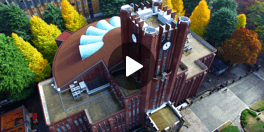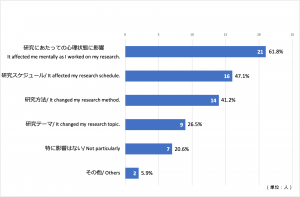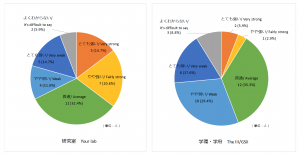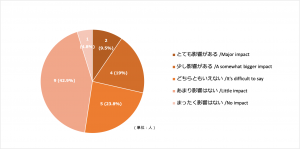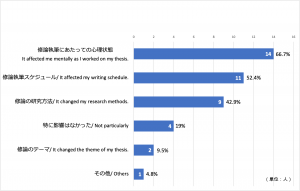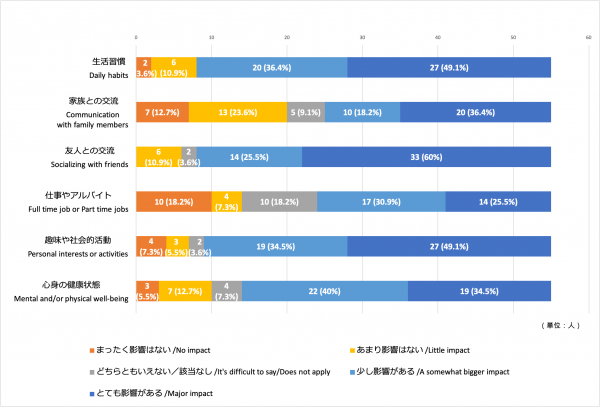
March 31, 2021
「M1&M2に聞く『コロナ禍の学府生活』」アンケート結果(後編)"Life as a master's student at GSII during the COVID-19 pandemic" survey results (Part 2)
ニューズレター&ウェブ編集部が2-3月に行ったアンケートの結果報告、後編は「研究・修論・進路について」と「日常生活について」をお送りします。(前編はこちら)
Part 2 of the survey results cover responses to questions regarding the pandemic’s influence on research, master’s thesis and future plans, as well as everyday life. (You can read Part 1 from here)
研究/修論/進路について On research/master’s thesis/future plans
要旨・Gist of the findings:
- コロナの影響については、M1/M2ともに研究を進めたり修論を書く上での「心理状態」にあるとの答えがM1(61.8%)、M2(66.7%)と最も多かった。
- M1では「研究スケジュール」(47.1%)、「研究方法」(41.2%) 、「研究テーマ」(26.5%)と続いた。
- M2では「執筆スケジュール」(52.4%)、「研究方法」(42.9%)と続いたが、「修論のテーマ」への影響は9.5%。
- M1と比べてM2の「テーマ」への影響が少なかったのは、修論のテーマを変えずに、コロナ禍でもできる研究方法を模索したり、スケジュールを調整した方が多かったと推測される。逆にM1は最初からテーマの変更を迫られている人がいるともいえる。
- 特に影響がない人も一定の割合いる(M1 20.6%、M2 19%) 。
- When working on their research/thesis, respondents felt that the greatest impact of the pandemic was on their mental state (M1 61.8%, M2 66.7 %)
- For M1 students, this is followed by research schedule (47.1%), research method (41.2%) and research topic (26.5%)
- For M2 students, this is followed by thesis writing schedule (52.4%) and research method (42.9%), but research topic was small (9.5%)
- Most M2 students maintained their research topic but have readjusted their methods and schedule, but some M1 students are having to change their research topic from the start of the program due to the pandemic.
- Some 20.6 percent of M1 students and 19 percent of M2 students have not seen any impact of the pandemic on their research/master’s thesis.
Q13-①:(M1へ)新型コロナ感染拡大が研究に影響を及ぼしていますか?(複数回答可)/ (To M1) Has the pandemic affected your research activities? (multiple choice)
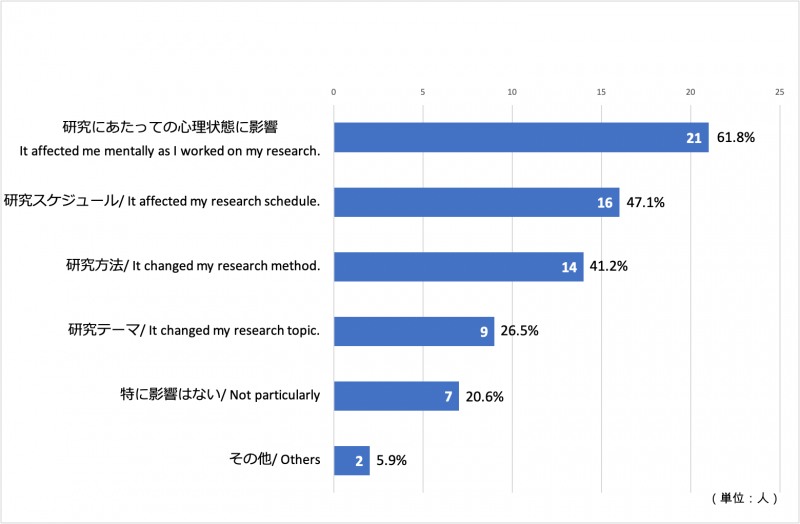
M1への研究への影響に対する質問(複数回答)では、最も多い回答は「研究にあたっての心理状態」(61.8%)でした。研究スケジュール(47.1%)、研究方法(41.2%)、また研究テーマ(26.5%)への影響が出ている方もいるようです。一方で特に影響がない方も20.6%ありました。
In a multiple-choice question regarding the pandemic’s influence on research activities, 61.8% said it “affected them mentally as they worked on their research.” For another 47.1% the pandemic “affected their research schedule”, while another 41.2% said their research methods were affected. Some 26.5% said they changed their research topic due to the pandemic. Meanwhile, 20.6% said their research was not affected.
Q13-②:(M2へ) 新型コロナ感染拡大が修論に影響を及ぼしましたか?(複数回答可)/ (To M2) Has the pandemic affected your master’s thesis?

修論への影響について伺ったところ(複数回答)、もっとも多かった答えは「執筆にあたっての心理状態」(66.7%)となりました。「執筆スケジュール」(52.4%)「研究方法」(42.9%)と続きましたが、修論のテーマへの影響は9.5%でした。一方で特に影響がない方も19%ありました。
How has the pandemic impacted master’s theses? To this multiple-choice question, 66.7% said it affected them mentally, while another 52.4% said it changed their writing schedule, and 42.9% changed their research methods. Some 9.5% said it changed the topic of their thesis. Meanwhile, 19% said the pandemic had no impact.
Q14: Q13で「特に影響はない」以外を選んだ方のみ、具体的な影響の内容をご自由に述べてください。/Please elaborate your response to the previous question.
研究への具体的な影響については「研究室で学生や先生とディスカッションする機会が損なわれた」「ゼミ以外の人と研究について話す機会が少ない」など、仲間と議論する機会が減ったことが多く聞かれました。また「研究資料の収集への影響」「人間相手の研究のためテストユーザーを集めるのが大変」「自宅ではシステムのプロトタイピングが難しく、手を動かせないので研究が遅れ、やる気を失っている」「モチベーションが保てないため研究テーマがいつまでも決まらない」「カウンセリングに通っている」など、精神面への影響も聞かれました。
修論への具体的な影響の自由記述回答には「実験が進めにくい」」「調査データの収集や期間を変えた」「被験者を募ることが難しくなり研究方向を変えた」「遠方へ調査にいくのが大変」「資料収集や文献講読がおもうようにできなかった」「調査を対面ではなくオンラインで行った」など物理的な制約からくる影響、また「コロナによって変わったわれわれの視点に着目」「オンライン会議ツールによって身体性が変化することに焦点を当てた」など、コロナの影響を研究に取り込んだ形でのテーマや研究方法を模索したことへの言及もありました。「孤独感が強く、モチベーション維持が難しかったり、細かい不安な点があっても解消できずにいた」「全体的に憂鬱な気分になることが多かった」「パンデミックのストレスで研究がおもうようにできなかった」など心理的な影響も聞かれました。
How exactly did the pandemic affect the research activities of M1 students? Several respondents commented that they were deprived of the opportunity to engage in discussions with professors and colleagues within the lab. One respondent also mentioned that he/she barely had any opportunity to talk about his/her research with people outside their lab. Another raised the difficulty of gathering research materials, which resulted in having to compromise with research papers that did not meet the standard. Another said it has been difficult to create prototypes necessary for his or her research, and such difficulty in making progress has resulted in a decline of motivation. One respondent has been seeing a counselor to consult about his or her mental health.
Among the detailed description of the pandemic’s impact on writing their master’s theses, some comments by M2 students were related to physical restrictions: “It was difficult to do inspection work,” “I had to change how and when I gathered data,” “It became difficult to find examinees for my research so I had to change the direction of my thesis,” “It became difficult to visit a distant location for research,” “I couldn’t gather research materials as much as I wanted to,” “I had to conduct interviews online instead of in-person,” “I had to give up fieldwork.” Some said they took advantage of the changes brought by the pandemic and incorporated that into their theses: “I paid attention to the fact that our views have changed because of the pandemic,” “I focused on how online meeting tools change our embodiment.” Meanwhile, some noted the psychological impact: “I felt very isolated, and it was very challenging to keep my motivation,” “I was often feeling down,” “Due to the stress brought about by the pandemic, it was difficult to conduct research.”
Q15. (M2へ)新型コロナ感染拡大が進路にどの程度影響を及ぼしていますか?/ (To M2) How big is the impact of the pandemic on your future plans?
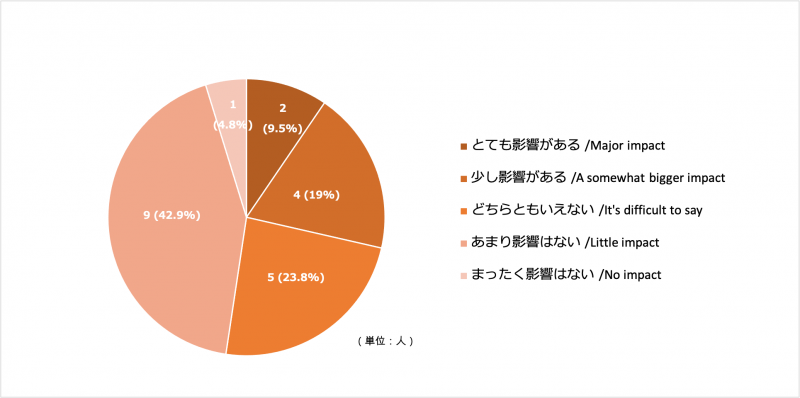
COVID-19の感染拡大の進路への影響については、回答者の半数近くはあまり影響がない(42.9%)とのことでしたが、「少し」(19%)、「とても」(9.5%)と影響があった方も2割以上いました 。
When asked about their future plans, 42.9% of M2 respondents said the pandemic had little impact, but 19% saw some impact and another 9.5% said they felt a major impact.
Q16:(M2へ)Q15で「影響がある」と答えた方は、具体的な内容を自由に述べてください。/ (To M2) Please elaborate your response regarding Q15.
具体的には「志望していた会社が緊急事態宣言中も対面での面接を要求してきたため、方針が不安になりその会社への志望度が下がった」「対面での説明会などの機会が減った」など、コロナの影響による企業側の対応を指摘する声が聞かれました。留学生の中には日本語能力試験の延期により、受験が遅れて最新の結果を企業に出せなくなった人もいたようです。博士課程の申請資料の入手困難に直面した声もありました。
Some comments were related to issues arising from how companies dealt with recruitment during the pandemic. One of the respondents said his or her interest in a company declined after it sought an in-person meeting during the first state of emergency in April and May 2020. Another respondent commented on the lack of in-person job events and seminars to attend, resulting in a decline in the number of companies with which they could interact. One person also said that he or she had to delay taking the Japanese Language Placement Test as it was cancelled in July, which made a difference to his/her language qualifications. Another person said it was difficult to obtain necessary documents to apply for the PhD program.
日常生活への影響について/On everyday life
要旨・Gist of the findings
- 「友人との交流」「趣味や社会的活動」「生活習慣」「心身の健康状態」への影響が高い傾向に。
- 特に留学生からは帰国できず、家族と会えないことのつらさが聞かれた。
- 逆に母国にいたため、日本への入国が叶わず時差の中でオンラインで授業を受けていたケースも。
- 社会人にとっては、仕事と学業が両方ともオンラインになり、やりくりをしやすくなった声もあれば、むしろ業務が増えたために研究がしづらくなった、という声もあった。
- A majority of respondents said that they had felt the pandemic’s impact on socializing with friends, personal interests and activities, daily habits, mental and/or physical well-being
- Foreign students expressed the hardship of not being able to return to their home countries.
- One student meanwhile could not enter Japan for months.
- Among students with a full-time job, some have been able to balance remote work and study, while others said that remote work has consumed time from his or her studies.
Q17: 新型コロナ感染拡大が日常生活にどの程度影響を及ぼしていますか?/How big is the impact of the pandemic on your daily life with regards to the issues below?
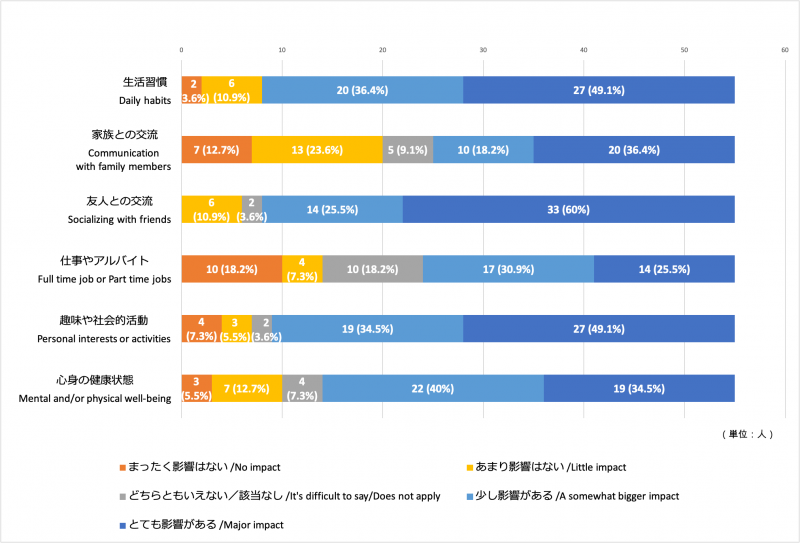
日常生活へはさまざまに影響が出ている様子が浮かび上がりました。特に「友人との交流」「生活習慣」「趣味や社会的活動」「心身の健康状態」への影響が高い傾向に。留学生は特に家族との交流への影響が見受けられました。
The pandemic has had an impact on the respondents’ lives in various ways, from socializing with friends, daily habits, personal interests and activities, mental and/or physical well-being, as well as communication with family members.
Q18: Q17の具体的な影響の内容をご自由に述べてください。/Please elaborate your response to Q17.
日常生活への具体的な影響としては、「外出や遠出が難しくなった」「人と直接会わなくなった」「新たな友人ができない」「人と話す機会が大幅に減ってつらい」「帰省ができない」などからくる孤独感、無気力感を指摘する声が複数ありました。また留学生からは「帰国の困難」もあれば「水際政策のために日本への入国が9ヶ月叶わず、時差で授業をとったので生活習慣に影響が出た」という声も聞かれました。
一方で、社会人からは「仕事も授業もリモート化したことで両立できるようになった」との声もあれば「仕事もオンラインになり、業務が増加し研究時間を圧迫した」とのコメントも。仕事での収入が減ったという経済的な影響も聞かれました。また「自宅に静かな場所を確保できず一人暮らしを始めた結果金銭的負担が増大した」という声もあれば、「コロナをきっかけに実家へ戻ったことで家族との時間が増えた」という方もありました。
運動不足や精神的なつらさ、やる気のなさなど心身へのマイナス影響を指摘する声も複数ありましたが、「自分のペースで勉強できる」「就寝時間が早くなり、毎日運動をするようにもなり健康状態がよくなった」とのポジティブな答えもありました。
When asked for details about the pandemic’s impact on their daily lives, several noted that having to stay home and refrain from traveling and socializing had really affected them both physically and mentally. Comments like “I feel isolated” “I feel lonely” “I feel less inclined to do things” were heard. Exchange students said that not being able to leave Japan to visit their families was very difficult. Meanwhile, one student could not return to Japan for nine months because of government policy and had to take classes while enduring the time difference.
Another respondent began to live solo during the pandemic because it was difficult to secure a quiet environment at home, which resulted in extra costs. On the contrary, one respondent moved to live with his or her parents which increased communications with them.
Meanwhile, one comment read: “Because both my work and classes became remote, I have been able to do both.” But another respondent whose work and study also became remote said the amount of work increased and this has taken time away from his or her studies. One person reported a decline in income.
Some have seen positive changes. One respondent touched on how he or she became used to getting up early in the morning and working out daily, thus becoming healthier. Another commented that “I’m happy to be able to study at my own pace.” Another person noted that he or she had adapted to the changes: “All these categories changed but not all in a bad way. The way we interact and conduct our daily lives has adapted.”
Q19: コロナ禍への対応について、学環・学府に望むことがあれば自由に述べてください。/If there is any action you want the III/GSII to take regarding its response to the pandemic, please write it below.
コロナ禍への対応について学環・学府に望むことについては、「コミュニケーション機会の拡大」など対面授業の再開や人との交流の機会を設けてほしいという意見が複数ありました。カウンセリングなどの紹介などを期待する声もありました。「図書館の前日予約制をやめるなどしてもう少し使いやすくしてほしい」という意見もありました。また「オンデマンド授業の動画を細切れにし、動画外のコミュニケーションを取るような進め方をしてほしい、ゼミはハイブリッドでの継続を期待したい」「オンライン授業の継続、およびネット環境が整っていない学生への支援」というような意見もありました。
When asked if they had any requests for the III/GSII regarding the response to the pandemic, several commented that they would like to see more in-person classes and events resume. One requested psychological support/services that are more conversation/consultation-based. A few people also asked for the III library to allow better access to the books by easing the appointment-based service. Meanwhile, one respondent expressed his views toward on-demand classes for lectures, while encouraging the use of hybrid classes for seminars. Another said he or she hoped the online classes will continue while providing support for students without stable internet connection.
まとめ/Summary:
- M1M2にとって、 2020年度の学府生活は、さまざまな場面において対面でのコミュニケーションの機会が奪われたことがもっともつらいことであったことが明確に現れた。
- オンライン授業は評価されているが、感染症対策を行った上での対面授業の再開やハイブリッド型授業の開催、また学内交流の機会を設けてほしいなど、対面で交流する機会が増えることへの要望もあった。
- For M1 and M2 students, the most difficult part about student life under the pandemic has been the reduction of opportunities to communicate in person with their peers
- While online classes are appreciated, some have requested increasing in-person communication opportunities, be it classes or social events
企画 : ニューズレター&ウェブ編集部 / Organized by the Newsletter & website editorial team
構成・グラフ:金佳榮(特任研究員)/ Editing & Diagrams: Kayoung Kim (Project researcher)
構成・記事:神谷説子(特任助教)/ Editing & Text: Setsuko Kamiya (Project assistant professor)
英語校正:デービッド・ビュースト(特別専門員)/ English copyediting: David Buist (Senior project specialist)

